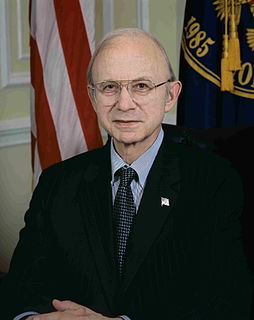Related Research Articles

The United States Department of Homeland Security (DHS) is the U.S. federal executive department responsible for public security, roughly comparable to the interior or home ministries of other countries. Its stated missions involve anti-terrorism, border security, immigration and customs, cyber security, and disaster prevention and management.

The National Archives and Records Administration (NARA) is an independent agency of the United States government charged with the preservation and documentation of government and historical records. It is also tasked with increasing public access to those documents which make up the National Archive. NARA is officially responsible for maintaining and publishing the legally authentic and authoritative copies of acts of Congress, presidential directives, and federal regulations. NARA also transmits votes of the Electoral College to Congress. It also examines Electoral College and Constitutional amendment ratification documents for prima facie legal sufficiency and an authenticating signature.
Archives New Zealand is New Zealand's national archive and the official guardian of its public archives. As the government's recordkeeping authority, it administers the Public Records Act 2005 and promotes good information management throughout government.
The "thirty-year rule" is the informal name given to laws in the United Kingdom, the Republic of Ireland, and the Commonwealth of Australia that provide that certain government documents will be released publicly thirty years after they were created.

The Home Office (HO), also known as the Home Department, is a ministerial department of the Government of the United Kingdom, responsible for immigration, security, and law and order. As such, it is responsible for policing in England and Wales, fire and rescue services in England, visas and immigration, and the Security Service (MI5). It is also in charge of government policy on security-related issues such as drugs, counter-terrorism, and ID cards. It was formerly responsible for Her Majesty's Prison Service and the National Probation Service, but these have been transferred to the Ministry of Justice. The Cabinet minister responsible for the department is the home secretary, a post considered one of the Great Offices of State; it has been held since July 2019 by Priti Patel.

An archive is an accumulation of historical records – in any media – or the physical facility in which they are located. Archives contain primary source documents that have accumulated over the course of an individual or organization's lifetime, and are kept to show the function of that person or organization. Professional archivists and historians generally understand archives to be records that have been naturally and necessarily generated as a product of regular legal, commercial, administrative, or social activities. They have been metaphorically defined as "the secretions of an organism", and are distinguished from documents that have been consciously written or created to communicate a particular message to posterity.

The National Archives is a non-ministerial government department. Its parent department is the Department for Digital, Culture, Media and Sport of the United Kingdom of Great Britain and Northern Ireland. It is the official archive of the UK government and for England and Wales; and "guardian of some of the nation's most iconic documents, dating back more than 1,000 years." There are separate national archives for Scotland and Northern Ireland.

The Freedom of Information Act (FOIA), 5 U.S.C. § 552, is a federal freedom of information law that requires the full or partial disclosure of previously unreleased information and documents controlled by the United States government upon request. The act defines agency records subject to disclosure, outlines mandatory disclosure procedures, and defines nine exemptions to the statute. The act was intended to make U.S. government agencies' functions more transparent so that the American public could more easily identify problems in government functioning and put pressure on Congress, agency officials, and the president to address them. The FOIA has been changed repeatedly by both the legislative and executive branches.

The National Archives of Australia (NAA), formerly known as the Commonwealth Archives Office and Australian Archives, is an Australian Government agency that serves as the national archives of the nation. It collects, preserves and encourages access to important Commonwealth government records.
In the United Kingdom, a DSMA-Notice is an official request to news editors not to publish or broadcast items on specified subjects for reasons of national security. DSMA-Notices were formerly called a DA-Notice, and before that called a Defence Notice (D-Notice) until 1993.

The Advisory Council on Historic Preservation (ACHP), an independent federal agency, is charged with the mission to promote the preservation of the nation's diverse historic resources. The ACHP advises the President and Congress on national historic preservation policy and also provides a public forum for stakeholders and the public to influence federal agency decisions regarding federal projects and programs that affect historic properties. The ACHP promotes the importance of historic preservation to foster an understanding of the nation's heritage and the contribution that historic preservation can make to contemporary communities, along with their economic and social well-being.

Allen Weinstein was an American historian, educator, and federal official who served in several different offices. He was, under the Reagan administration, cofounder of the National Endowment for Democracy in 1983. He served as the Archivist of the United States from February 16, 2005, until his resignation on December 19, 2008. After his resignation, he returned to the International Foundation for Electoral Systems as a senior strategist and was a visiting faculty member at the University of Maryland.

Executive Order 13233 limited access to the records of former United States Presidents to a higher degree than the previous Order 12667, which it superseded. It was drafted by then White House Counsel Alberto Gonzales and issued by George W. Bush on November 1, 2001. Section 13 of Order 13233 revoked Executive Order 12667 which was issued by Ronald Reagan on January 18, 1989.

The Information Security Oversight Office (ISOO) is responsible to the President for policy and oversight of the government-wide security classification system and the National Industrial Security Program in the United States. The ISOO is a component of the National Archives and Records Administration (NARA) and receives policy and program guidance from the National Security Council (NSC).
The National Archives of Trinidad and Tobago is the repository for permanent records and archives of the Government as well as historical records of national significance. The beginnings of the National Archives can be traced back to the aftermath of the disastrous fire of 1903 at the Red House, Port of Spain. This fire destroyed almost all the records in the Colony. Subsequently, provision was made in the construction of new Government buildings for fireproof strong vaults for the storage of records. Despite the provision of vaults, there was no policy or procedure for the acquisition and preservation of historical records.
The Joint Committee on Vaccination and Immunisation (JCVI) is an independent expert advisory committee that advises United Kingdom health departments on immunisation, making recommendations concerning vaccination schedules and vaccine safety. It has a statutory role in England and Wales, and health departments in Scotland and Northern Ireland may choose to accept its advice.

Public Record Office Victoria (PROV) is the government archives of the Australian State of Victoria. PROV was created by the Victorian Public Records Act 1973 with responsibility for the better preservation management and utilization of the public records of the State. It is an agency of the Department of Premier and Cabinet.
The Low Pay Commission (LPC) is an independent body in the United Kingdom, established in 1997, that advises the government on the National Minimum Wage. It is an advisory non-departmental public body of the Department for Business, Energy and Industrial Strategy (BEIS).

Archival research is a type of research which involves seeking out and extracting evidence from archival records. These records may be held either in collecting institutions, such as libraries and museums, or in the custody of the organization that originally generated or accumulated them, or in that of a successor body. Archival research can be contrasted with (1) secondary research, which involves identifying and consulting secondary sources relating to the topic of enquiry; and (2) with other types of primary research and empirical investigation such as fieldwork and experiment.
The Ministry of Education (1944-1964) was a central government department governed by the Minister of Education, with responsibility in England and Wales for:
- Promoting the education of people;
- Developing educational institutions;
- Developing policy to provide a comprehensive educational service;
- Securing the effective execution of the education policy by local education authorities
References
- ↑ "The Advisory Council on National Records and Archives - GOV.UK". www.gov.uk. Retrieved 2017-06-26.
- ↑ Shepherd, Elizabeth (2009). Archives and Archivists in 20th Century England. Routledge. ISBN 9781317178866.
A new umbrella Advisory Council on National Records and Archives was established, combining the responisbililities of the former Advisory Council and the HMC Commissioners
- ↑ Archives, The National. "The National Archives - Homepage".
- ↑ Archives, The National. "The National Archives - Homepage".
- ↑ "Record number of Government files kept secret in 'affront to our democratic ideals'". The Independent. August 3, 2017.